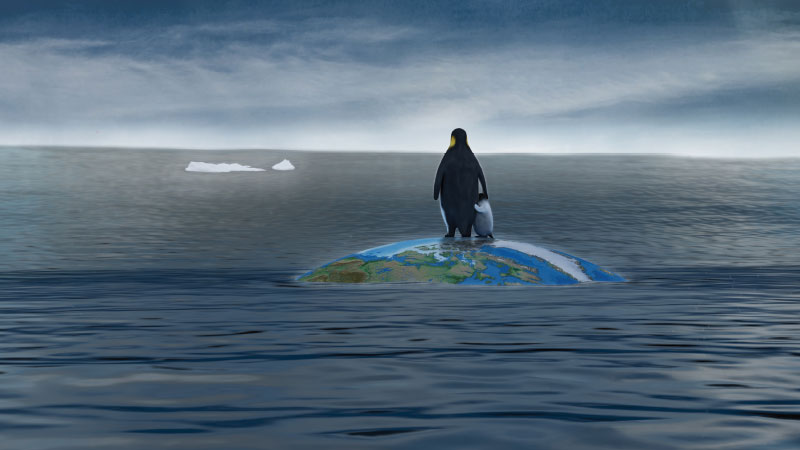By Mike Jarrett
As oceans get warmer, sea levels rise and the land (and all that is on it) disappears,
because nothing will stop the sea. And the land is already disappearing as more glacier-size chunks of frozen water at the poles melt and fall into the sea.
Meanwhile, some coastal cities in the Caribbean-Gulf of Mexico are already dealing with sea level rise.
“In the United States, Louisiana is on the front line of this climate crisis. It’s losing land at one of the fastest rates on the planet… at the rate of a football field every 45 minutes.”
Louisiana lawyer, now activist, Colette Pichon-Battle certainly had her audience’s attention when she uttered those words. It was a presented at an official TED conference and the founder and Executive Director of the Gulf Coast Center for Law & Policy was there to present the perspective on an informed person. Her topic: Climate Change will displace millions.”
Dr. Pichon-Battle spoke of disappearance and erasure of coastal cities and communities and the devastating and revolutionary change this will bring.
“Erasure is what communities around the globe are fighting,” she said.
Addressing the socio-political impacts of Climate Change and Sea Level Rise (SLR), she took note of the gentrification in the southern USA which she attributed to Climate Change.
“Climate gentrification that happens in anticipation of sea level rise is what we’re seeing in places like Miami, where communities that were kept from the waterfront are now being priced out of the high ground where they were placed originally, as people move away from the coast.
“We’re facing a shift in every aspect of our global reality. And climate migration is just one small part, but it’s going to have ripple effects in both coastal cities and cities in the interior.”
Climate migration caused by Sea Level Rise will force communities to seek higher ground. Business operators, like private citizens, will have the option to relocate to somewhere in the hinterland and a choice of where. Ports however have fewer options. The question is: what are those options?
Instructive
A recent attempt by PORTSIDE CARIBBEAN to review discussions and plans for rising sea levels proved disappointing but instructive. Responses (and the lack thereof) to the short questionnaire distributed through the Port Management Association of the Caribbean to its member-ports suggested that Sea Level Rise is not a hot topic among the 18 major regional seaports in the region.
One may surmise that this reflects more a lack of urgency than simple disinterest. Regardless, given increasingly incontestable evidence, there is no time for either.
Causes
There are basically three causes of Sea Level Rise, according to National Geographic: (a) thermal expansion; (b) melting ice at the Earth’s polar caps and glaciers; and, (c) ice loss from Greenland and West Antarctica.
(a) As water is heated, it expands. It is estimated that as much as half of the increase in Sea Level Rise recorded during the past century was due to the world’s oceans getting warmer.
(b) The increased warming of Earth’s atmosphere has caused the melting of some the planet’s largest ice formations. Massive ice shelves have been collapsing into polar oceans; graphic images of shrinking polar ice caps all testify to a massive and continuing global ice melt. Normally, these huge ice caps and glaciers at the poles will melt during summer months but snow from evaporated sea water replenishes the ice mass during the winter. Persistently higher temperatures caused by global warming have led to greater-than-average summer melting and reduced snowfall due to later winters and earlier springs.
(c) Similarly, increased heat on the planet is causing the ice that covers Greenland and Antarctica to melt rapidly.
Caribbean impact
With relatively few exceptions, most major cities of the Caribbean are built at or just above sea level. The highest population densities are in the major cities and towns close to the shore. Rising sea levels will therefore have far-reaching social implications. The Caribbean region depends heavily on tourism – which delivers about 15% of Gross Domestic Product (GDP) and 13% of employment. But the regional figures tend to hide the reality. Tourism accounts for than 25% of GDP in most tourist destinations and more than 50% in many.
The Caribbean’s main tourist attractions are magnificent coral beaches and some of the most fascinating submarine reefs on Earth. Most of the infrastructure and superstructure for tourism, including airports are located at or about sea level and on the coast.
As sea levels rise and saltwater reaches farther inland destructive erosion of infrastructure and machinery will slow production. Flooding of wetlands and spawning habitats will destroy tens of thousands of species – flora and fauna. As sea levels rise, there will be flooding of aquifers, reducing availability of drinking water. Agricultural soil will become increasingly contaminated and food production will decline.
Tropical storms and hurricanes will generate even more devastating storm surges, ravaging what remaining infrastructure is left in already drowning cities.
Social unrest and human tragedy will mount as hundreds of thousands of people are forced to abandon coastal areas that they have occupied for generations but now vulnerable to flooding. Low-lying islands which now enhance a tourist destination’s product will be largely under water while some will completely disappear.
Whatever the human response to Climate Change, no single initiative will be sufficient. There is no panacea. For coping with SLR, all methods will be complex. All will require much time and a tremendous amount of capital to plan, design, finance and implement.
The time to urgently discuss SLR, its risks and solutions is now. This is all the time we have.

